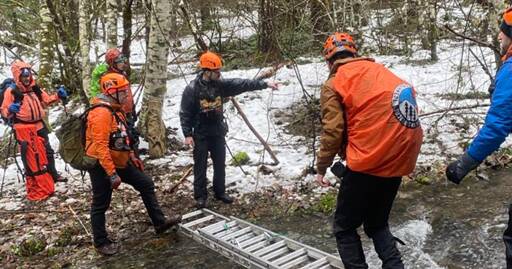Summary
Two Oregon men, aged 59 and 37, were found dead from exposure in Washington State’s Gifford Pinchot National Forest after failing to return from a Christmas Eve trip to search for Sasquatch.
The Skamania County Sheriff’s Office attributed their deaths to harsh weather and lack of preparedness.
A family member reported them missing early Christmas Day, prompting a three-day search involving 60 volunteers, drones, canines, and Coast Guard infrared technology.



What I’m saying is: adults are responsible for what they believe.
No one can enable an adult to do anything. They are adults who make choices.
Who is anyone to tell people that they can’t publish a book or make a piece of media (as long as the topic is not illegal). That’s some authoritarian shit right there.
So then we should not criminally try people for scams and fraud? Bernie Madoff was innocent?
Also, who said anything about stopping anyone from publishing anything? Please do quote me.
“The people who push books and TV shows and stuff to convince others…” would be the quote.
I think there’s a difference in liability sure. Financial pyramid schemes are where people choose to invest their money but then that money is misappropriated. The scammer takes money for a service and doesn’t do what they said they will do with it.
If I choose to bet my life’s savings on GME and purchase the shares then yeah that’s my own fault (as long as insider trading / pump and dump on the other side has not occurred). No matter what people “pushed” me to believe (as long as this doesn’t cause violence or harm to others), the responsibility on following through with those beliefs is mine.
Just like I said if someone is leading a paid Bigfoot wilderness excursion into the woods then yes I think there could be an argument for their liability if people die on their tour. Just as there’s liability if people die skydiving or bungee jumping.
If someone tells me Bigfoot is out in the woods on Christmas Eve and as an adult I choose to believe them that is my choice, not theirs.
I’m just saying we have to be careful calling ideologies dangerous or saying that people are being “pushed” toward things - lots of people argue that LGBT and trans ideology is dangerous. I think they’re ridiculous bigots for saying that but we have freedom of expression in most western countries. If I want to be able to freely express my opinion, other people have to be able to freely express theirs.
Where in that quote did I say they should be stopped? I don’t see it, because I didn’t say it. I didn’t even read the rest of your post if you’re going to just lie like that. I said no such thing.
Hey man it’s possible I could be misunderstanding your viewpoint but what I am hearing is: People are pushing beliefs that you think harm people.
My basic counterpoint to that is: No one forces anyone to believe anything. People are allowed to believe what they want.
If you believe harm is caused do you think anything should be done about it?
Correct.
Therefore, all scams should be legal. This is based on your logic.
That is very context-dependent.
Yet again, please quote me saying it should be stopped in this specific case. Either that or I’ll just flag you for trolling and move on.
“Do not promote mythology or ideology as reality” implies that you’re saying it should be stopped.
I’m just saying this is a simple misunderstanding and I’m really trying to come to some understanding with honest debate - I’m not approaching this to troll, just to understand. Willing to let it go!
That is not true. Stop lying about what I am saying. Repeatedly insisting I am saying it should be stopped doesn’t make it true.
Do you really think any time anyone says “don’t,” they mean “this person needs to be stopped?” If I say to someone, “don’t watch that movie, it’s awful,” am I saying they should be stopped from watching it? You really think that’s what is being implied?
My interpretation isn’t unreasonable. Saying ‘Do not promote mythology or ideology as reality’ sounds prescriptive, as though you’re making a strong recommendation about what people should or shouldn’t do, especially in the context of your initial comment (discouraging spending money on a Bigfoot convention). Thank you for clarifying that is not what you meant.
I think we’re still at an impasse in how we define scam, but that is ok.